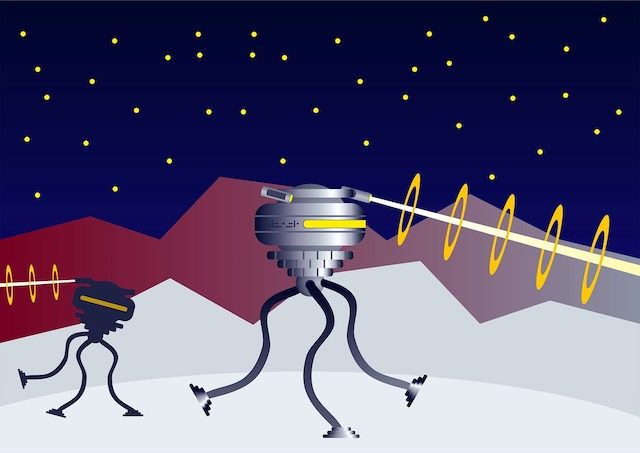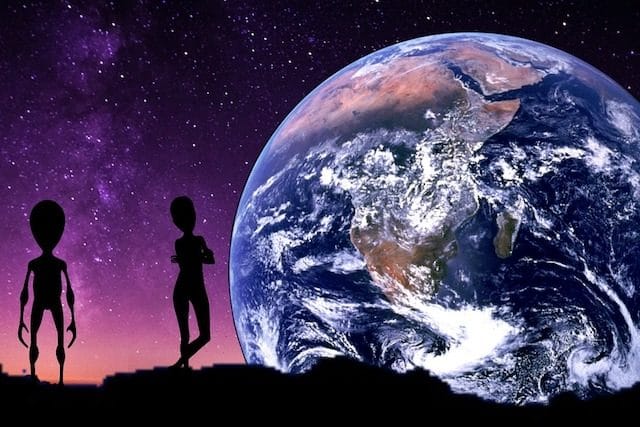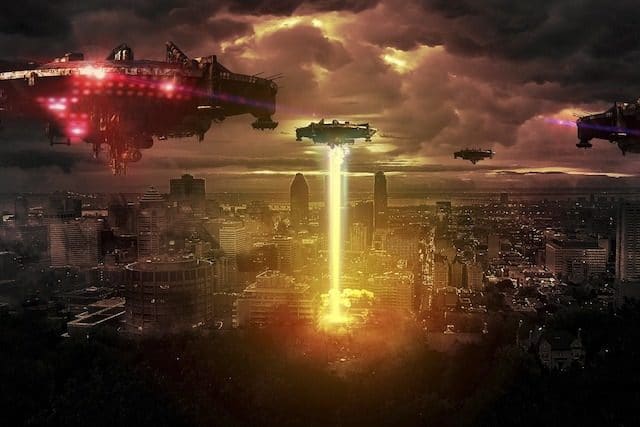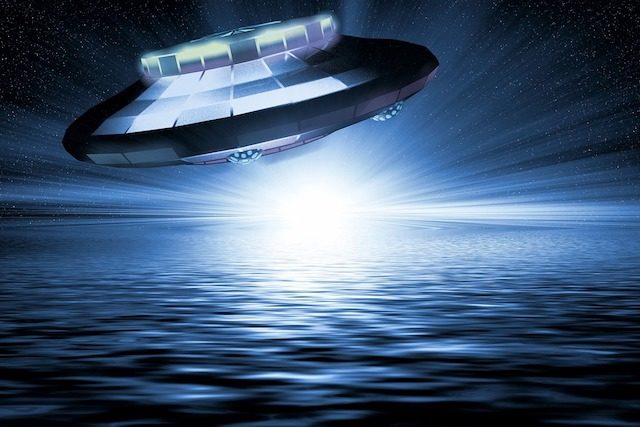It’s time for some good, old-fashioned speculation. What would happen if aliens visited earth? Now, the speculation and assumptions we’re about to make are based on logic, philosophy, educated guesses, probabilities, nature, and of course, our own history. After all, our frame of reference is quite limited when it comes to possible encounters with extraterrestrial life. So, we have to imagine the most plausible scenarios, as well as try to think outside the box as much as possible.
If intelligent alien species were to discover Earth (if they haven’t already), will they just take a look and decide it’s not worth the hassle to deal with our primitive ways, or will they enrich our lives with knowledge beyond our current understanding? Will we recognize them as life in the first place, or will they treat us like we would a nasty parasite?
10. Aliens in History

Our biggest fear when it comes to alien encounters has a lot to do with our own history, and what we know can happen if a technologically advanced civilization encounters an inferior one. Let’s take a look at the Age of Discovery, and particularly the Colonization of the Americas at the turn of the 16th century. As many of us know, the Europeans were looking to find alternative roots to India due in part to the break-up of the Mongol Empire, which up until the 15th century assured safe passage for trade caravans on land. And secondly, because of the Ottoman Turks, who took over the East Mediterranean and were hostile towards the Europeans.
As a result, they took to the oceans, virtually stumbling upon the Americas in 1492. The technological difference between the Native Americans and the “alien” Europeans was, at best, a few centuries apart. But that small difference proved fatal for the natives. In fact, with a handful of conquistadors, a few native allies, several horses, and a few cannons, Hernan Cortes was able to singlehandedly bring down the mighty Aztec Empire. If an alien species were ever to visit us, the same thing might happen, but on a global scale.
After all, if an intelligent species is capable of interstellar flight and reaching Earth from a faraway star system, then you can be sure they’re likely thousands of years ahead of us in technological terms. And like the Aztecs, who had the numbers and the weapons to defeat Cortes and his men, they had little chance in standing in his way. And even if they did, that would have only postponed their inevitable demise at the hands of the technologically superior Europeans, who now knew of their existence. Even Stephen Hawking has a dire warning for the human race when it comes to alien species: “The history of advanced races meeting more primitive people on this planet is not very happy, and they were the same species. I think it would be a disaster.”
9. The Cultural Shock and Ensuing Panic

If alien species ever decide to pay us a visit, there are several near certainties that would happen, regardless of those aliens’ intentions toward us. For starters, if we were to wake up one morning with a huge spaceship hovering above our house, and then hear reports of similar sightings all over the world, we can be fairly certain that panic would ensue. Even if we humans are inquisitive by nature, we’re not really fond of surprises, especially of that magnitude. This reaction would stem, of course, primarily from past experiences in our own history.
Moreover – and this shouldn’t come as a surprise – we’d be hit with an enormous wave of cultural shock. Even in this age of technological advancements, when people are more connected than ever, there are still large numbers of people who cannot and will not accept other people’s cultures, traditions, or different ways of thinking. But, for better or worse, we have had previous contacts with each other over the centuries, and even though we’re still not used to other opinions or points of view, we are somewhat influenced and accepting of them… to a certain degree.
But what would happen if we come across a species which will most likely look totally different, and maybe have a totally different view about life, and existence itself? Will they be religious, or not? Do they even need to eat, and if so, do they use mouths to do it? There is virtually an infinite number of things that can be construed as different, and if we still can’t accept other people’s habits and traditions, then we can be sure that we won’t accept alien ones. One good thing that might come out of all of this is that, if aliens visit Earth and decide to contact us, we will most certainly forget all of our current disagreements with each other, no matter how different or crazy they might see them today.
8. But What Would They Look Like?

We’re all familiar with the “Greys” as the generic alien. They’re… well, gray (duh), bipedal, and hairless, with big eyes and big heads, long fingers, shorter in stature than we are, and very skinny. But isn’t this more of an interpretation of how we might look in the far future? In fact, some theorize that, according to our own evolutionary trends, slowly but surely, this is what humanity will turn out to be. The first time these Gray Aliens made an appearance as presented here was in the 1893 article “Man of the Year Million,” written by famous author H.G. Wells. The article, as the title suggests, was an interpretation of how humans would look one million years into the future.
Anyway, chances are that aliens will look totally different than these “Greys.” But, nevertheless, for an intelligent species to evolve far enough in order to master space travel, it will need to be terrestrial. As Fermilab physicist Don Lincoln, puts it: “There could be alien cavemen underwater. But truly, you can’t smelt metal [down there],” meaning that dolphins, if left to their own devices, may one day become even more intelligent than they are today. But because they live underwater, it is highly unlikely that they’ll be able to develop any kind of moderately advanced technology.
Furthermore, there could be other similarities we’d share with technologically advanced alien species via a phenomenon evolutionary biologists call “convergent evolution.” This is a process through which organisms not closely related to each other independently evolve similar traits as a result of having to adapt to similar conditions. These include some organs, like the eye, or behavior, like pack predation. Humans have also developed similar scientific and technological advancements while completely isolated from each other; things like basic tools and weapons, language, writing, the domestication of plants and animals, and even mathematics.
But when it comes to the differences, it is more statistically probable that aliens would live on habitable planets unlike Earth, and will look unlike us humans. Again, even though we don’t have any other frames of reference other than what we see on our own planet, this is still enough for physicists and statisticians to come to the conclusion that the majority of alien species out there will be different than our own. Chances are that they’ll be bigger than us, roughly 770 pounds – the size and weight of a polar bear. Moreover, they’ll be living in smaller groups than we do; some 20 million strong or less, and on smaller planets than Earth – less that 80% its size.
7. They’ll Most Likely be Machines, Though

Humans were able to invent the radio around the year 1900. Then, 45 year later, the first computer came into existence. And now, we’re able to manufacture relatively cheap devices with greater computing power than even the human brain itself. What’s more, artificial intelligence is not that far off in the foreseeable future. On this trend, Senior Astronomer at the SETI Institute Seth Shostak bases his prediction that any advanced form of intelligence we will encounter will take on the form of a machine. He believes that any alien civilization capable of space travel will also follow this path. He even states they’ll integrate technology into their bodies, to the point where there will be no more organic matter left. “It’ll be like — you build a four-cylinder engine. You put it in a horse to get a faster horse. And pretty soon you say, ‘Look, let’s get rid of the horse part and just build a Maserati,'” said Shostak. “So that’s probably what’s going to happen.”
He goes on to say we humans are the result of 4 billion years of Darwinian evolution, based on random variations with no particular goal or master plan. But machines, on the other hand, are totally different. Their evolution is based solely on efficiency and improvement on older models. What’s more, machines don’t require a myriad of conditions in order to survive, like an Earth-like habitable planet, and they certainly wouldn’t be tied to their ancestral homes. As long as they have a steady supply of raw materials and energy – something which the universe certainly doesn’t lack – they will have no problem in traveling great distances or even living in outer space indefinitely. By this logic, Shostak believes that the best chance to find these machine beings is in the center of galaxies, where there’s lots of available energy. That, or wait another 30 or so years, until we invent autonomous AI for ourselves.
6. The “Perfect Utopia”

At first glance, the best case scenario if aliens were to descend on Earth is for them to completely disregard our primitive and vengeful ways, and take us under their wing. They would then go on to teach us the way toward a utopic future where we not only live in harmony with them, each other, and the surrounding environment, but also continue on striving toward our own betterment, both technologically and socially. Sounds good, right? And hey, by the sheer size of the observable universe and the seemingly infinite number of planets out there, there could be at least a handful of alien species that’ve made it their business to seeking out underdeveloped ones, like ourselves, and lifting them up from their “uncivilized” ways. They could share with us new technologies and reforms for all sorts of things, in terms of medicine, society, energy, education, transport, and whatever else we might think of.
But the question here is whether this is the best thing for us in the long run? Be careful what you wish for, right? Being exposed to too much technology and too much change, too fast, can have dire repercussions on society. After all, it took us an incredibly short amount of time from when nuclear weapons were invented, to when we first used them on other people. It was war, yes, but still – the effects of radiation and radiation poisoning were barely understood. Or what about fossil fuels? They are, indeed, an incredible source of energy, almost unequalled in terms of caloric value per pound (which is the reason we’re now struggling to find alternatives). And because of their awesome power potential, we’ve used them to the point where we are now faced with our own possible self destruction.
Indeed, some benevolent aliens could teach us to avoid these shortcomings and use powerful technologies responsibly. But in doing so, these aliens would make us completely dependent on them, and thus negate the whole “uplifting” thing in the first place. After all, there is no such thing as perfect, or a Utopia, and especially, there is no such thing as a pleonastic “perfect Utopia.” The only thing that exists, though, is our own striving toward these ideals.
5. Remote Observation or Indirect Guidance

Who here can, without a shadow of a doubt, say that aliens haven’t visited us already? Or who can say that they’re not here still? For better or worse, aliens could now be living among us and we would be none the wiser (Mickey Rourke, anyone?). They could also be orbiting our planet, hidden from sight and studying us continuously, avoiding interfering, and with the sole purpose of mapping out the universe and everything in it. This was, after all, the primary mission of Star Trek’s own Enterprise; to map the Milky Way galaxy and not interfere with the natural development of any life forms they might encounter.
There is, of course, the chance that these hypothetical observers might have a plan for us after all. By infiltrating our society, they could, slowly but surely, be influencing us in one direction or another. They could be trying to direct us towards a “Utopia” state without taking any of the credit, or they could have a more sinister goal in mind. And if this were to be the case, and they were trying to influence us in any direction, then chances are that their actions are not particularly aimed towards our own wellbeing, regardless of their intentions.
4. Divide and Rule

“Divide and rule” is a political, social, and military strategy through which one can gain or maintain power by breaking up other concentrations of power into more manageable pieces that individually can’t pose any serious threat. By causing and igniting rivalries and generating discord among people and groups of people, one can effectively break up already existing centers of power, or prevent smaller ones from ever coming together. Machiavelli identifies this idea as a military strategy in his sixth book from The Art of War series. Here he talks about any military captain and how he should, by any means possible, divide the enemy’s forces, either by making the other captain suspicious of his own men, or to somehow cause him to split his own army, becoming weaker as a result.
This strategy would make complete sense for any potential warlike alien species that wants to take over Earth with minimum casualties on their part. After all, even Hernan Cortes broke off parts of the Aztec Empire by drawing various peoples to his side first, before bringing the Aztec Empire to its knees. What’s more, these people who allied themselves with Cortes in favor of the ruling Aztecs ended up sharing the same fate. And by looking at the world today, we can, more or less, see these strategies being implemented, either by aliens or ourselves.
3. We Are Alone… or Maybe Just the First

Even though, statistically speaking, this is next to impossible, there’s still a faint chance that we are completely and utterly alone in the seeming infinite universe. Governed by the natural laws of physics and with the vast quantities of stuff around, some say anything that is possible, according to these laws, has already or will inevitably happen. This idea, however, weakens the claim that we’re alone even further, doesn’t it? But even so, after almost 14 billion years of the universe since the Bing Bang, space seems devoid of life with the exception of us. To be fair, though, we’ve just begun to stare into the abyss. But given these many opportunities for life to arise, and the ample time it’s had at its disposal to develop, shouldn’t we see alien spaceships zipping by on the “galactic highway” on a daily basis?
This seemingly inconsistent situation may have something to do with the Fermi Paradox. This principle simply states that complex life may have a way tougher time at developing than we previously thought, and the chances of any one advanced civilization to emerge are very slim. Maybe the exact conditions for complex life weren’t there up until fairly recently in the universe, making us among the first, if not the actual first intelligent species to emerge. Or maybe there are still some unforeseen hurdles ahead of us, or even some cosmic or highly-advanced alien traps that we’re not aware of, at which any civilization developed enough to reach them would be instantly destroyed. If this is the unfortunate case, then, according to our own level of technological development – some decades after actual space travel, and several centuries before interstellar travel – we are now closer to our end as a species, than to our inception.
2. Forever Lab Rats

Reality is, as many of us already know, inside our heads. And more importantly, reality is what the collective society believes it to be. Any deviation from that collective consciousness is seen by others who don’t share in it as either outdated, barbaric, backward, illogical, or even downright crazy. This idea also comes to us through Plato’s Allegory of the Cave. Anyway, gravity, the Earth, your car, your friends, and possibly even you yourself, could be just your own perspective on what they are, and there could be a multitude of other faces to those particular “coins.” Humanity wasn’t handed any sort of guide book about life and where it’s going, so we had to make the rules ourselves as we went along. But did we? These sorts of questions can spark endless debates and may never be answered or even fully understood.
But for the sake of argument, if we were to take a lab rat and somehow tap into his mind and understand his thoughts, as simple as they may be, what do you think it would consider reality to be? Let’s suppose that the lab rat was bred in captivity and that he knew nothing else outside the cage he’s kept in, the room that cage is in, and the scientists who pass by. How do you think he would perceive the world in front of him? Normal, everyday reality of life would be the right answer. Then, who’s to say that we’re not currently living in our own cage, living out our normal, everyday lives while under constant scrutiny from an unknown intelligence, performing all sorts of experiments on us? Who’s to say we have to die in the first place? After all, scientists have discovered a built-in “self-destruct timer” in our very genes. So, if this is actually the case and we are actually lab rats under strict control from something or someone else, then do you think that we’ll ever escape our condition? Let’s ask the rats that question, or the scientists themselves.
1. The Natural Laws of Physics are… Alive

It’s theorized that the universe came into being approximately 13.8 billion years ago with the Big Bang. Subsequently, life on Earth appeared nearly the instant the planet formed, according to a new study, 4.1 billion years ago, and 300 million years earlier than previously believed. But between these two cosmic events there’s an almost 10 billion year gap in which we can’t really say what happened in terms of life. What if life began somewhere else? Let’s say, 5 billion years prior to life here on Earth? That’s quite a head start! Imagine you could go back into the past 200,000 years while driving a 4×4, wearing jeans, holding a smartphone, and handing out candy bars to all the early humans you meet. How would you appear in their eyes and minds? Now think about how a 5, or 6, or 8 billion-year-old alien civilization would look to us. You can’t. No one can. But some theorize.
We could be staring alien life in the face and not even recognize it. Astrophysicist Caleb Scharf even goes as far as saying that the entire universe and all the physical laws of nature that go with it are possibly alive and a result of billions of years of technological evolution. This theory would explain why we haven’t yet encountered other life in the universe, regardless of the countless other planets it could have “sparked” on. He also states that, given the possibility of other building blocks suitable for life to exist outside of molecules, an alien civilization could then transfer itself and its entire physical world into that new form. By this logic, our universe could be just one of these new forms of existence. Scharf also points out that only about 5% of everything out there is matter as we know it, while 27% remains mysterious and unseen. This is what’s known as dark matter and it’s everywhere, even here on Earth. Dark matter is what holds the universe in its current state, and here, alien life could exist, all around us, but always hidden from our sight.
2 Comments
Pingback: 10 Cases from Project Bluebook: the CIA's Secret Hunt for UFOs - Toptenz.net
Worst thing ever? To have seemingly friendly aliens land and hand you a pamphlet called “To Serve Man”…
https://en.wikipedia.org/wiki/To_Serve_Man_(The_Twilight_Zone)
Yeah, that would suck.